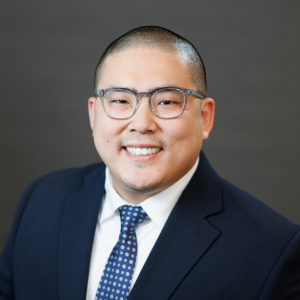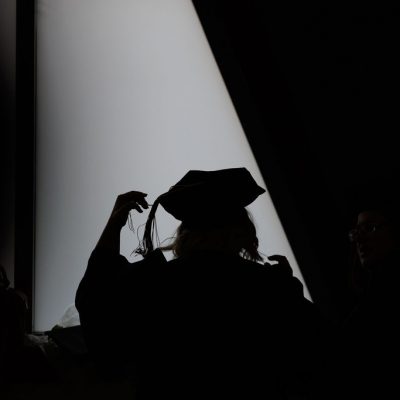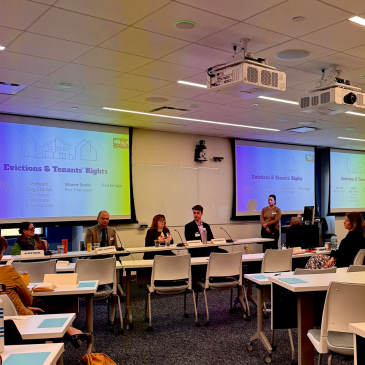A blog post by Iris Michaud, Administrative Coordinator for Student Services and Academic Affairs
 Dean Danielle Conway and Professor Emily Michiko Morris, who directs our LL.M. program, recently returned from a trip to Wuhan, China, where they signed an international partnership agreement with Zhongnan University of Economics and Law (ZUEL). Dean Conway delivered welcome remarks to open the 2018 Symposium of International Criminal Justice Strategic Cooperation and Development. Professor Morris delivered a presentation titled, “Criminal Enforcement of IP Rights in the U.S.” In addition to representing the University of Maine School of Law at the symposium, they took the opportunity to meet with officials from neighboring Wuhan University School of Law. Their trip marks an opportunity to further Dean Conway’s strategy of growing the Maine Law LL.M. program and its international partnerships.
Dean Danielle Conway and Professor Emily Michiko Morris, who directs our LL.M. program, recently returned from a trip to Wuhan, China, where they signed an international partnership agreement with Zhongnan University of Economics and Law (ZUEL). Dean Conway delivered welcome remarks to open the 2018 Symposium of International Criminal Justice Strategic Cooperation and Development. Professor Morris delivered a presentation titled, “Criminal Enforcement of IP Rights in the U.S.” In addition to representing the University of Maine School of Law at the symposium, they took the opportunity to meet with officials from neighboring Wuhan University School of Law. Their trip marks an opportunity to further Dean Conway’s strategy of growing the Maine Law LL.M. program and its international partnerships.
On the heels of their trip, we paused to reflect on our path of building a co-curricular program that honors the international student journey. It goes without saying that our international students come with a certain English proficiency level to follow law school classes. At the same time, it is important for us as hosts to frame-shift and imagine ourselves in their shoes. They brave living and studying in an environment where “normal,” for many, is turned on its head.
As Americans we can travel to most regions of the world and find someone who will break the language barrier for us. English is so widely spoken that we don’t have to stretch ourselves quite as much. Surely many of us have learned another language or traveled to communities where English is less common. If we were not accommodated by tourist resorts, and other home culture “bubbles,” then we would more readily recall the discomfort of stumbling our way through a foreign language. We would remember using a mixture of exaggerated body language and enthusiastic facial expressions to convey what our limited vocabulary could not. We would recollect accidentally using words that carried an opposite or embarrassing meaning. We would remember feeling vulnerable, insecure, and eager to gain local approval. We would recall the feeling of being mentally and physically drained from the process of thinking and speaking in a foreign language. Our internal dialogue of navigating unfamiliar cultural norms was constant, as was interpreting the firestorm of new non-verbal cues.
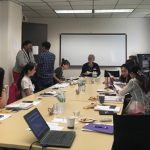 Most of our international students, especially our LL.M. students, are from China. To be effective and considerate hosts, we set a goal to deepen our knowledge of Chinese culture. The Dutch social psychologist Geert Hofstede is well known for his studies on key cultural dimensions and how culture influences behavior. A quick look at the “Hofstede Insights” tool on country comparisons reveals steep differences between American and Chinese cultural patterns within the dimensions of individualism, power distance, indulgence, and long term versus short term orientation. Cultural patterns are not meant to stereotype anyone; instead, they give us clues about values and subsequent behaviors that tend to be dominant in a culture. Cultural tendencies help us identify what motivates behavior, which in turn helps us meet intercultural challenges with more curiosity and less judgement. It also reminds us to approach all behavior and situations with less judgement and more curiosity because culture lives in us all.
Most of our international students, especially our LL.M. students, are from China. To be effective and considerate hosts, we set a goal to deepen our knowledge of Chinese culture. The Dutch social psychologist Geert Hofstede is well known for his studies on key cultural dimensions and how culture influences behavior. A quick look at the “Hofstede Insights” tool on country comparisons reveals steep differences between American and Chinese cultural patterns within the dimensions of individualism, power distance, indulgence, and long term versus short term orientation. Cultural patterns are not meant to stereotype anyone; instead, they give us clues about values and subsequent behaviors that tend to be dominant in a culture. Cultural tendencies help us identify what motivates behavior, which in turn helps us meet intercultural challenges with more curiosity and less judgement. It also reminds us to approach all behavior and situations with less judgement and more curiosity because culture lives in us all.
It is from these reflections that we draw our inspiration in the Office of Student Services for developing programs that honor the multidimensional journey of our international students. We assessed where the students’ greatest needs were and over the past two years have implemented four key areas of programming:
- Multi-Day International Student Orientation:
Our international student orientation includes technology and logistics sessions, a mini introduction to Portland and Maine, an introduction to U.S. law and case briefing, a campus tour, and an optional shopping trip. The international students then join the three-day orientation with our incoming J.D. students. - Academic “Lunch & Learn” Series:
This series is an extension of our Academic Success Program and is specifically designed for international students. It offers tutoring support and includes themed academic sessions in a weekly group meeting facilitated by a second-year teaching fellow. It doubles as a group space where they can process, review, and contextualize material. - Local Semester Excursions:
Portland, Maine has a rich coastal, food, and outdoor culture. Through the local semester excursions, our students can experience sea kayaking, a ferry cruise, ice-skating, and indoor rock-climbing. Portland was recently named “2018 Restaurant City of the Year,” and our students get to experience the many flavors of the city with a guided food tour. - Peer Liaison Program:
Our peer liaison program matches international students with peer students or “liaisons,” all of whom volunteer to help their students acclimate to Maine Law. Some international students can become comfortable in their “bubble,” especially with students from their home culture. Much of it is natural; too much can foster isolation and a closed-group dynamic that misses richer experiences. Shared commitment in the students’ partnership is essential and we highlight the importance of it to both sides.
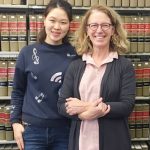 It is worthwhile to highlight the peer liaison experience of Wenhua and Kathryn in a bit more detail, because it so beautifully models their shared effort. Wenhua Tang is a current LL.M. student from Weihai in the Shandong province of China. She studied legal interpretation at Qufu Normal University. This is her first time in America and she chose Maine Law because Portland is, in her words, a “cozy” city. Her peer liaison, Kathryn King, is a current second year student who started law school after a 25 year high school teaching career. The mother of two biological children and two stepchildren, Kathryn is from Michigan and spent most of her life in Maine. Because of their busy schedules, Wenhua and Kathryn don’t meet often, but their engagement is consistent. They recently met to exchange stories of family and reflections on culture.
It is worthwhile to highlight the peer liaison experience of Wenhua and Kathryn in a bit more detail, because it so beautifully models their shared effort. Wenhua Tang is a current LL.M. student from Weihai in the Shandong province of China. She studied legal interpretation at Qufu Normal University. This is her first time in America and she chose Maine Law because Portland is, in her words, a “cozy” city. Her peer liaison, Kathryn King, is a current second year student who started law school after a 25 year high school teaching career. The mother of two biological children and two stepchildren, Kathryn is from Michigan and spent most of her life in Maine. Because of their busy schedules, Wenhua and Kathryn don’t meet often, but their engagement is consistent. They recently met to exchange stories of family and reflections on culture.
Wenhua shares that she is accustomed to lectures and a high power and hierarchical distance between professors and students in China. She enjoys the more informal and interactive learning in her Maine Law classes, but says it was challenging at first to adapt to speaking in class. She also notes that she and her Chinese classmates often know the answers but sometimes don’t volunteer them because their thoughts don’t translate into English. Many law students fear cold calling; for many Chinese students the mere concept of engaging more casually with professors in class, or challenging an argument publicly, takes braving a polar-opposite culture.
When we asked Kathryn about her observations, she says that Wenhua is deeply respectful of being an international student and seems to keep her own counsel on controversial topics. She hopes that they can eventually exchange a bit more about social or economic challenges that permeate American and Chinese life. Kathryn also notices that traditions and customs play an important part in Wenhua’s life. Wenhua tells us that she is involved with the Chinese & American Friendship Association of Maine where she and her Chinese classmates perform singing, dancing, and piano playing. It helps them create a shared sense of home when homesickness sets in. For Kathryn, the motivation to be a peer liaison is rooted in the desire to make students like Wenhua feel at home. During her teaching career, Kathryn taught many foreign students. She says, “The whole learning dynamic is different for them. Not just the linguistics, but also the medium in which everyone operates. You can read all the travel books you like, but if you’re not in it, you don’t know what it’s like.”
Kathryn is impressed by how much Wenhua is embracing her Maine experience. Wenhua was also elected by the student body to be a student representative in our Student Bar Association (SBA). The SBA is the Law School’s student government and, on their own initiative, they implemented a seat on the SBA for an international student representative. For Wenhua, it doubles as a cultural experience and she is excited to represent her international peers.
We asked Wenhua what advice she has for international students, and we asked Kathryn the same for liaisons. Wenhua says being brave, engaging, initiating questions, supporting one another, and asking her American peers for advice is crucial, as is remembering not just her academic but also her cultural motivation for studying in America. Kathryn says that meeting Wenhua immediately upon arrival was fundamental in helping build a consciousness about each other before “the storm” of law school hit. She also doesn’t underestimate the power of small gestures to stay connected: a note, an email, a coffee. She thinks it is important to figure out where her peer’s boundaries are, personally and culturally, and to become a part of her peer’s life to the extent that she’s allowed in.
As a small public institution with limited resources, we face the ongoing challenge of sustaining our initiatives. At the same time, it fuels our creativity and forces us to focus our energies on meaningful enrichment. Our goal is to identify additional channels for the social integration of international students that are sustained at a structural level. We hope to build on cross-departmental and school-wide collaborations to further that mission. The benefit of being small does allow for an advantage: a closer connection with many of our students. Every year Dean Conway invites international students to spend Thanksgiving with her family. To kick off international student orientation, she welcomes each student personally. In addition to providing personal and academic support to LL.M. students, Professor Morris provides airport pickups and makes time to join several semester excursions. Maine Law students like Kathryn King and Wenhua Tang are not only a benefit to our school, they fill an important need by honoring their shared commitment. When the SBA created a role for an international student representative, they furthered inclusion by giving international students a voice in student government. It is gratifying to see that when we all fuel the collective we become better for it.




